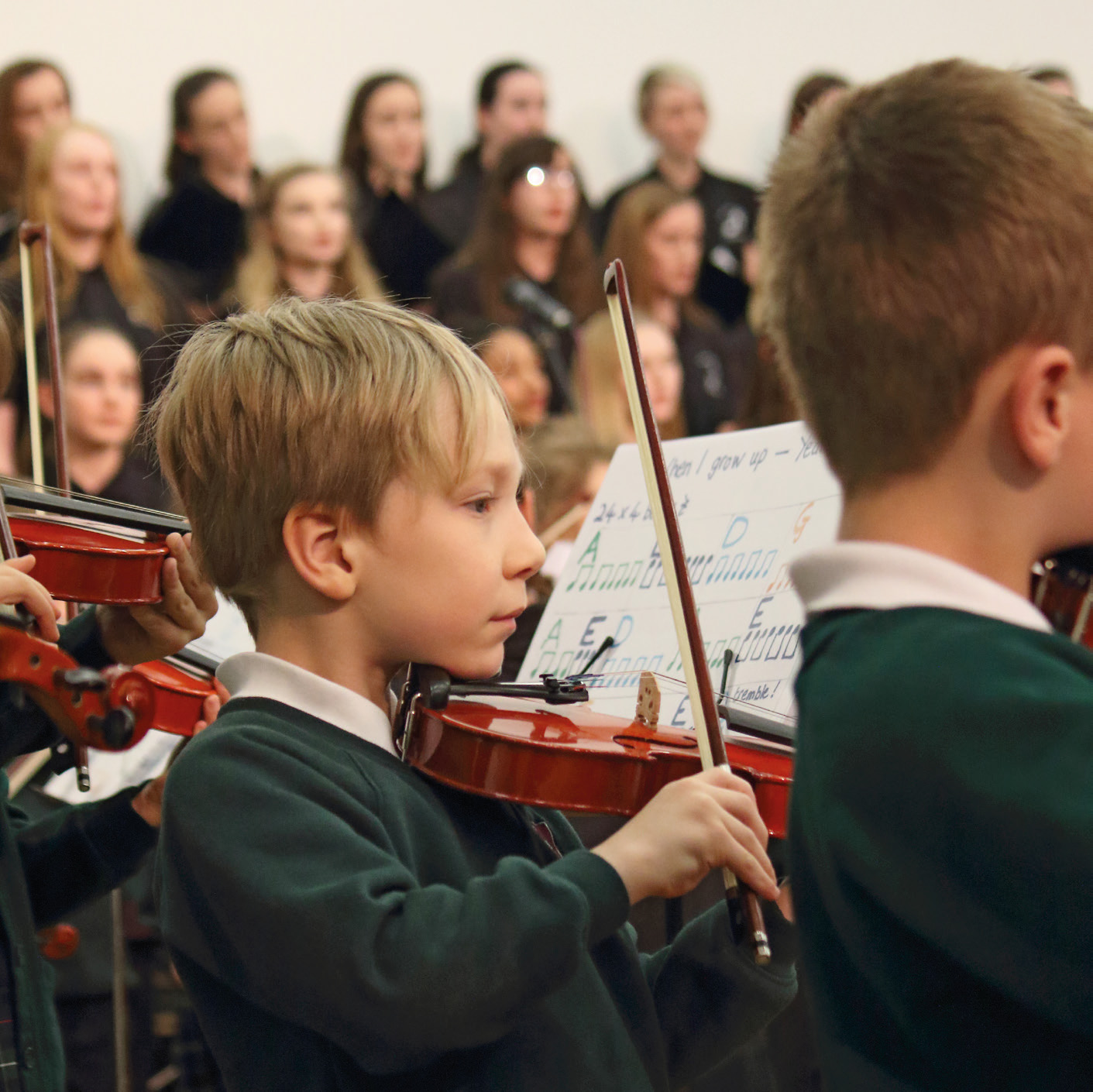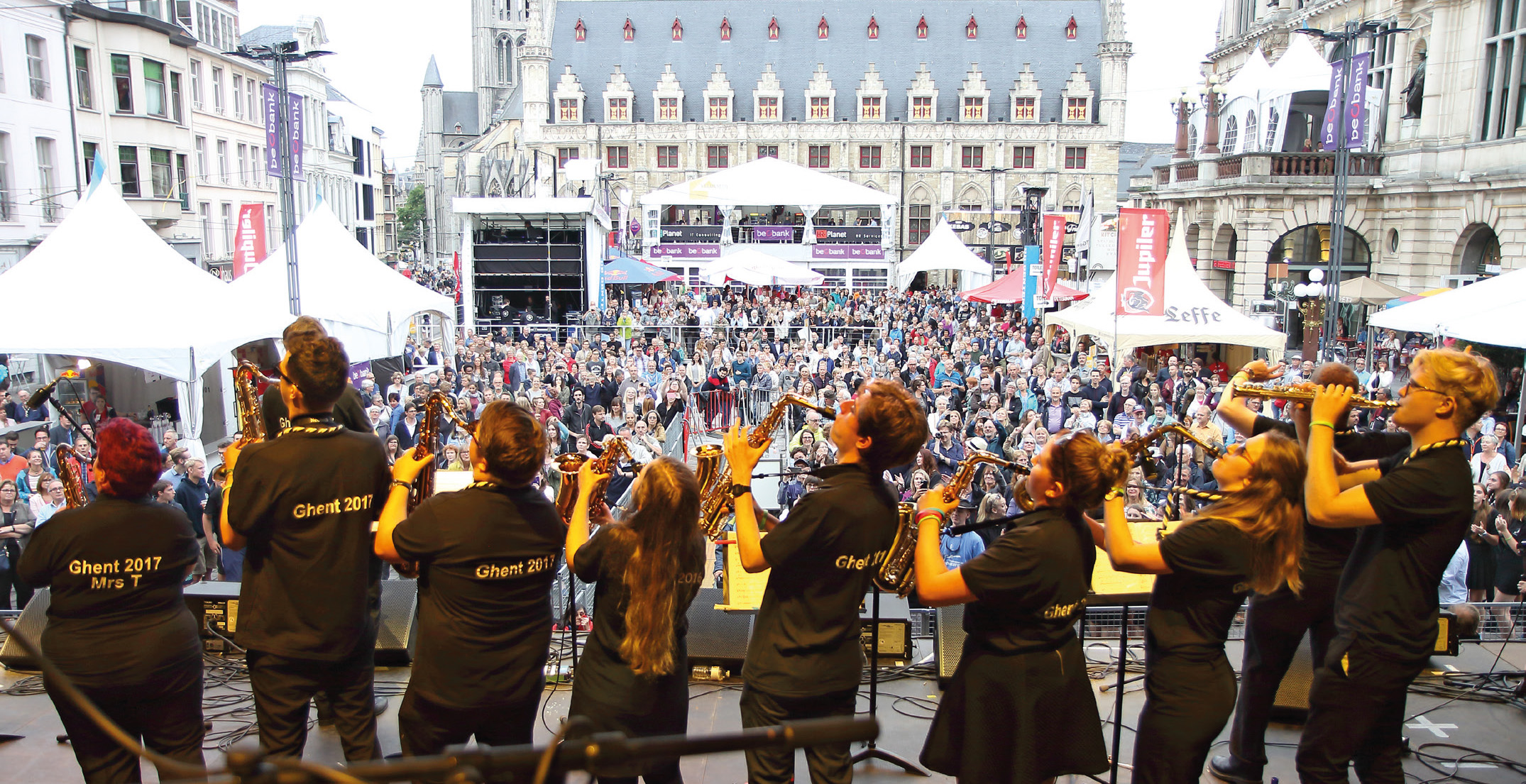
With cuts to school budgets, the loss of specialist music teachers, the exclusion of music from the EBacc and a primary curriculum under pressure from numeracy and literacy targets, a good news story about music education can be hard to find. But Hertford-based Simon Balle School is providing just that. An all-through school with academy status, which was given an Outstanding rating by Ofsted in May, its music department, led by director of music Mark Taylor, is busy, vibrant and – most importantly – well supported. More than a quarter of the school currently has instrumental or vocal lessons, with around 20% engaged in other regular school musical activities, in more than 25 concerts a year. Entries at GCSE sit at 48, with 16 taking the subject to A-level.
Taylor speaks of the importance of engendering a musical education right from the outset. Having children begin from the age of four allows the music department to, in his words, ‘saturate’ early education with music right from the beginning. ‘Music is the lifeblood of Simon Balle: we call ourselves a “musical school”. The head teacher and governors are equally passionate about a musical education for all and commit time, finances and energy to this end. With the advent of the all-through school [in 2015], music has become even more important as part of our mission. We believe in the “musical pyramid”: invest in the starters, get them hooked and the rest should evolve. One-off opportunities are fantastic, but do not lead to long-term sustained musical quality.’
To this end, the school has enabled a promising string scheme that begins in Year 2. ‘This is our version of First Access,’ says Taylor. ‘We worked with the local music hub to make it bespoke and we call it the Strings Training Programme. It is open to all, with a nominal charge for the year, and we have two shorter lessons a week rather than one longer one, to help the children remember and build, a little and often. They also have to take their instruments home and practise, using an online blog rather than practice books. The objectives of the scheme are to develop life-long string players, or players that go on and learn another instrument. We have had 43 of the 60 in Year 2 work all year, and they have performed as part of our all-through school with musicians through to Year 13’.
Building on quality
However, while getting as many children involved right from the start in music-making is one thing, ensuring quality is quite another. How does Taylor ensure the music in the school is not only accessible, but also reaching high standards?
‘All our music classes are taught by specialist musicians. I have found that our work needs to balance fun and music that stretches the musicians. We do not accept second-best in any performance, and the musicians will rise to the challenge and put in the practice because they want to be part of that quality. Rehearsals are for bringing the musicians together, not note-bashing – and they know that they are letting others down if they play a wrong note in a performance!
‘These principles have led to our concert band having 60 musicians, including a full percussion section, a big band performing to an amazing standard, four choirs, a junior wind band of 30, a Year 10 traditional band, a strings training programme, an adult choir and much more.’
Pressure on schools to deliver results for numeracy and literacy at Key Stages 1 and 2, plus the EBacc at KS4 – in which music is not included, of course – can often lead to tensions around extracurricular activities. How is a balance struck at Simon Balle? ‘We do not see a tension between this at all,’ says Taylor. ‘We have a couple of times a year when we have mid-week big concerts or rehearsals. However, most of our concerts are at evenings or weekends, especially around exam times. We know that curriculum comes first. For special occasions, such as performing at the Blackpool Tower Ballroom last April, taking one day out was not a problem. We know that we make a difference to the Progress 8 results of the school through music exams and through having happy students who love to be at school, often because of music. We track our pupil premium students to show their progress, and we have the musical evidence all the time of what we and our musicians achieve. With 8% of the school taking an instrumental exam last term, these examination milestones are also important’.

Mark Taylor: ‘This is our version of First Access… we call it the Strings Training Programme’

The Simon Balle big band performing at the Ghent Music Festival 2017
Musical community
Taylor emphasises that working with professional musicians is an important part of the department's ethos, and recent collaborations with composers Andy Scott and Jeffery Wilson attest to this. But how does the school fund these bookings, as well as its other musical commitments?
‘It is funded through traditional routes’, says Taylor, ‘including school, parental donations, fundraising and through local music hub funding.
‘Some projects – such as the potential to work with the Orchestra of the Age of Enlightenment – have hit a funding stumbling block, but we try to find the money if we can, when we know the relationship will make a massive difference to the quality of our work and results. These relationships help us develop all our musicians.’
Another theme of recent angst is staffing: for example, some schools have reported to the BBC this year of having to cut back on specialist staff. A line in Taylor's report on school music in the autumn term of 2017 stresses ‘tight’ staffing which will ‘need addressing’.
‘We want the very best and dedicated teachers for our musicians’, says Taylor. ‘Finding the best teachers is hard – we expect more than simply coming in, teaching and going away. We are a team and expect our visiting teachers to be part of that committed team, supporting all our musicians, coming to concerts, going the extra mile. Most importantly, we expect consistency between teachers – all working to the highest standard’.
It is clear that musical education and music-making is a defining quality of Simon Balle School, and at a time when music is not compulsory in academies, this is to be applauded.
Taylor urges all music teachers and managers in schools to commit to a sustainable music education for children. ‘All stakeholders must work together, including SLT, governors, parents, the local music hub, teachers, the local community and, most importantly, the musicians’, he says. ‘The benefits are huge: pride, achievement, happy musicians, children who want to come to school, a fantastic reputation, that feeling of amazement and awe, the feeling of the team. For any head of music, it takes over everything – but the rewards are memories for life.’








